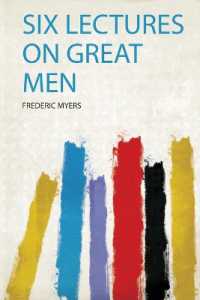- ホーム
- > 洋書
- > 英文書
- > Philosophy
Full Description
This book showcases a range of views on topics at the forefront of current controversies in the field of metaphysics. It will give readers a varied and alive introduction to the field, and cover such key issues as: modality, fundamentality, composition, the object/property distinction, and indeterminacy. The contributors include some of the most important philosophers currently writing on these issues. The questions and philosophers are:
Are there any individuals at the fundamental level? / (1) Shamik Dasgupta (2) Jason Turner
Is there an objective difference between essential and accidental properties? / (1) Meghan Sullivan (2) Kris McDaniel and Steve Steward
Are there any worldly states of affairs? / (1) Daniel Nolan (2) Joseph Melia
Are there any intermediate states of affairs? / (1) Jessica Wilson (2) Elizabeth Barnes and Ross Cameron
Do ordinary objects exist? / (1) Trenton Merricks (2) Helen Beebee
Editor Elizabeth Barnes guides readers through these controversies (all published here for the first time), with a synthetic introduction and succinct abstracts of each debate.
Contents
INTRODUCTION
Elizabeth Barnes, University of Leeds
PART 1: Are there any individuals at the fundamental level?
1. Shamik Dasgupta, Princeton University
2. Jason Turner, University of Leeds
PART 2: Is there an objective difference between essential and accidental properties?
1. Meghan Sullivan, University of Notre Dame
2. Kris McDaniel, Syracuse University
PART 3: Are there any worldly states of affairs?
1. Daniel Nolan, Australia National University
2. Joseph Melia, Oxford University
PART 4: Are there any indeterminate states of affairs?
Jessica Wilson, University of Toronto
Elizabeth Barnes, University of Leeds







